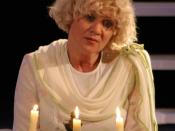Tennessee Williams' states, through the character of Tom, that he has "a poet's weakness for symbols" and this is especially evident in The Glass Menagerie, his first commercial success. As a playwright, Williams' faces the challenge of introducing imagery that is either viable or audible to the audience. He achieves this through his use of lighting, music and stage setting. Williams' calls this a 'memory play', both in the production notes and in the core text and as such he is able to use imagery and symbols which are self-consciously theatrical, without it looking obscure. Williams' broke away from the naturalistic movement of his time and The Glass Menagerie is a prime example of this.
The music used in the play is incredibly significant. Williams' communicates this, again, through Tom,
"In memory everything seems to happen to music. That explains the fiddle in the wings"
The play has its own theme tune, described as "the lightest, most delicate music in the world and perhaps the saddest."
This piece of music is inextricably linked to Laura and is used, primarily, to reflect the melancholy mood of the play and add emphasis her emotional strife at specific moments throughout the play. For example, at the end of scene one,
Laura: ... Mother's afraid I'm going to be an old maid.
The scene dims out with 'Glass Menagerie' music.
This music is used to create an air of poignancy specific to the tragedy of the pay. As an original piece of music it will hold no other meaning for an audience, and by choosing to do so Williams' ensures that his audience becomes entirely involved with his characters.
A completely different variety of music is also used in this play. The music which transmits from The Paradise Dance Hall provides a...


